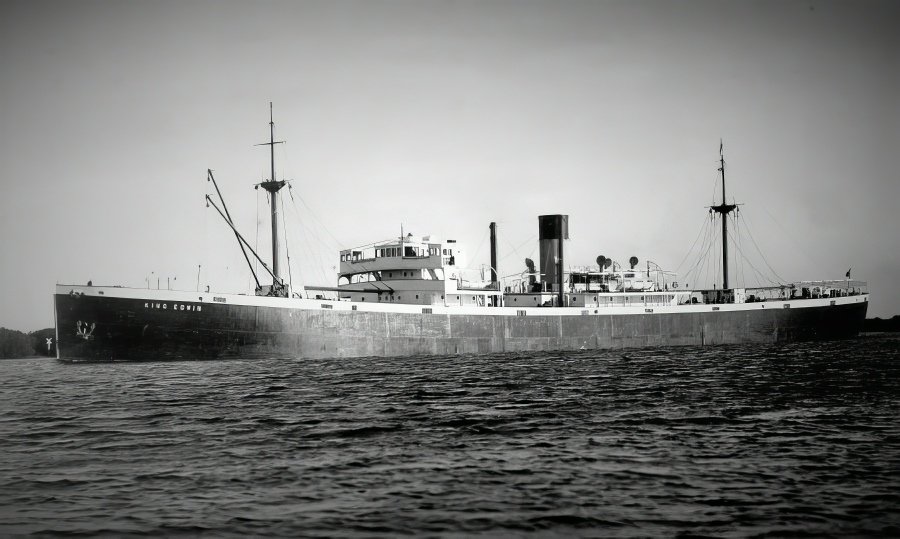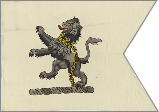The Malta Incident - Jim Brain BEM
Born at Barry Dock, South Wales in 1919 Jim left school in 1936 and joined the Reardon Smith Line ship `Bradfine`, not a happy start to his sea career as he developed appendicitis. Following his recovery he tried to join the Royal Navy in 1940, fortunately for the war effort and as later events will show, his application was unsuccessful. Later in the war he joined as Cook the King Line ship `King Edwin` which had been converted to an ammunition carrier at Suez and which then in 1943 sailed in convoy from Alexandria to the besieged George Cross island of Malta.
The ship was loaded with drums of aviation fuel and coal in her forward holds and ammunition in the aft holds, during this trip Jim helped to man the ships Oerlikon gun and following a thankfully safe passage the ship anchored in Grand Harbour, Valletta, Malta. At this stage of the war the island was under virtually constant air attack by the Luftwaffe who were attempting to destroy the port installations and airfields, which together with indiscriminate bombing of the islands population, was intended to destroy this threat to the supply lines of Rommel`s desert campaign.
On the 26th April 1943, the cargo was being unloaded and Jim was checking stores, when at about 8.00 pm a terrific explosion occurred on the fore part of the ship as a bomb struck her. Jim’s friend, steward Jack Britain called out `lets get out, this is no place for us` which in the circumstances seems like the best course of action. After fetching his bag containing essential belongings Jim went up on deck and saw that the fore part of the ship was blazing and that the crew were moving towards the ships jollyboat which was moored astern. Captain Lewis then shouted to Jim to give him a hand to attempt to douse the flames, this Jim and other members of the crew did, being joined later by Royal Navy and shore personnel
The fire fighting efforts continued until about 12.00 midnight when the senior Royal Navy Officer brought the men together and told them that the fire had now reached the cargo of coal and that it would be a short time until it ignited the ammunition, with disastrous consequences for the lives of the men and destruction of the surrounding port area. The remaining men were then told that the only course of action was to flood the affected holds and that volunteers would be required to undertake this action.
Despite the appalling conditions and ever-present danger the affected holds were flooded enabling the remaining fires to be extinguished and the ship was saved. She was later returned to service and survived the war, one of the very few ships of the King Line to do so. (This is not the case, King Edwin was refloated in 1945 and towed out to sea and scuttled)
Jim spent three weeks in hospital recovering from burns he had sustained while fighting the fire before he was told that he would be flown to Gibraltar by United States aircraft on the first leg of his journey home.
Fate, however had one more card to play, for when the aircraft reached Gibraltar such a strong cross-wind was blowing that the pilot, who had already made two attempts to land, warned the passengers to `brace themselves` as he made the third and final attempt. This was almost a disaster for as the aircraft touched down the crosswind caused it to `ground-loop` and hurtle down the runway on its back until coming to a halt. Many of the passengers were injured in the accident, though fortunately Jim escaped scot-free.
After spending almost four weeks in Gibraltar Jim managed to get a job as a Cook on a Dutch merchant ship and eventually landed at Newcastle. When he boarded a train on the first leg of his journey home to Barry Jim himself admits that he must have been an unkempt sight, for he had not shaved for three months and was dressed in an old duffel coat, dungarees and a battered uniform cap. The train compartment was packed with R.A.F men returning to St Athan but there was one empty space next to a W.A.A.F which was vacant and Jim sat down. As the train started the R.A.F men produced a bottle of scotch and passed it around, ignoring Jim, who fell asleep and then awoke to find one of the passengers looking at him intently, `are you merchant navy and have you been in trouble? ` he was asked, `yes` replied Jim and told the story of his exploits. This broke the ice and the scotch was passed around again, this time including Jim who made full use of the generosity offered.
Having changed trains at Crewe, Jim reached Cardiff a little `the worse for wear` and he was seen to the waiting room by the W.A.A.F who apologised for having ignored him when first they had boarded the train. Having now recovered Jim finally returned to Barry where after an absence of over five months he was met by his mother who told him that she had received an official telegram informing her that his ship had been lost and that Jim was not listed among the survivors.
After spending two months at home Jim joined a tanker bound for the West Indies working again as a Cook, later being appointed as Chief Steward. It was whilst serving on the tanker and when berthed at Port Elizabeth, South Africa, that Jim was summoned to the Captains cabin and invited to sit down and pour himself a drink. Having done as ordered he was then congratulated by the Captain on the award of the British Empire Medal for his actions in Malta. Following which he was treated to a celebration of the news in a local club and his shipmates made sure that the occasion was properly marked!
The award of the British Empire Medal was published in the London Gazette on the 5th November 1943 with the following citation: -
`The ship was discharging cargo when a violent explosion occurred and fire broke out in one of the holds. This was followed by a further explosion in another hold. The cargo included drums of aviation and motor spirit and the flames spread rapidly. Fire-fighting appliances were manned immediately and orders were given to flood the two holds. Strenuous efforts were made to fight the fire and to save the ship but these proved unavailing and assistance was obtained from naval and shore personnel. It was not until two days later that the fire was finally extinguished. Ships Cook Brain showed outstanding courage and devotion to duty in the fire fighting operations`.
From WW2 People’s War




